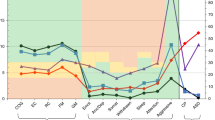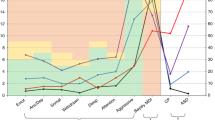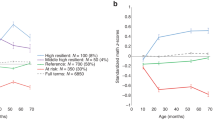Abstract
Objective
To define parenting/social characteristics associated with better-than-expected cognitive and motor outcomes in preschoolers at similar perinatal biological risk-level including various gestational ages at birth (GA) and perinatal complications.
Study design
Prospective cohort study (n = 87) of children at four years, median GA 29 weeks (IQR 26, 38). Assessments included Differential Ability Scales, Movement Assessment Battery, parenting styles, and social risk scores. Perinatal risk factors were weighted based on regression models for each outcome; individual calculated risk scores became predictors to extract standardized residuals from the mean (>1 SD above mean = better-than-expected). Mixed-effect regressions examined associations between positive adaptation and parenting/social factors.
Result
Perinatal risk scores explained 21–53% outcome variability. Children across all GA displayed positive adaptation. Children of parents with higher authoritarian scores had higher odds of better-than-expected outcomes (OR 1.17, p = 0.0002).
Conclusion
Parental structure may promote positive adaptation at preschool age in children with perinatal risk factors for poor development, including extreme prematurity.
This is a preview of subscription content, access via your institution
Access options
Subscribe to this journal
Receive 12 print issues and online access
$259.00 per year
only $21.58 per issue
Buy this article
- Purchase on Springer Link
- Instant access to full article PDF
Prices may be subject to local taxes which are calculated during checkout
Similar content being viewed by others
Data availability
Non-identifiable data are available on reasonable request five years after study conclusion from the corresponding author.
References
Fanaroff AA, Stoll BJ, Wright LL, Carlo WA, Ehrenkranz RA, Stark AR, et al. Trends in neonatal morbidity and mortality for very low birthweight infants. Am J Obstet Gynecol. 2007;196:e1–e8. 147.
Eichenwald EC, Stark AR. Management and outcomes of very low birth weight. N Engl J Med. 2008;358:1700–11.
Aarnoudse-Moens CS, Weisglas-Kuperus N, van Goudoever JB, Oosterlaan J. Meta-analysis of neurobehavioral outcomes in very preterm and/or very low birth weight children. Pediatrics 2009;124:717–28.
Bhutta AT, Cleves MA, Casey PH, Cradock MM, Anand KJ. Cognitive and behavioral outcomes of school-aged children who were born preterm: a meta-analysis. Jama 2002;288:728–37.
Anderson PJ, Doyle LW. Cognitive and educational deficits in children born extremely preterm. Semin Perinatol. 2008;32:51–8.
Luthar SS, Lyman EL, Crossman EJ. Resilience and positive psychology. Handbook of developmental psychopathology. Boston: Springer; 2014. p. 125–40.
Masten AS. Resilience theory and research on children and families: past, present, and promise. J Fam Theory Rev. 2018;10:12–31.
Landry SH, Smith KE, Miller-Loncar CL, Swank PR. Predicting cognitive-language and social growth curves from early maternal behaviors in children at varying degrees of biological risk. Developmental Psychol. 1997;33:1040.
Neel M, Stark A, Maitre N. Parenting style impacts cognitive and behavioural outcomes of former preterm infants: a systematic review. Child: care, health and development. 2018;44:507–15.
Dusing SC, Tripathi T, Marcinowski EC, Thacker LR, Brown LF, Hendricks-Muñoz KD. Supporting play exploration and early developmental intervention versus usual care to enhance development outcomes during the transition from the neonatal intensive care unit to home: a pilot randomized controlled trial. BMC pediatrics. 2018;18:46.
Spittle A, Orton J, Anderson PJ, Boyd R, Doyle LW. Early developmental intervention programmes provided post hospital discharge to prevent motor and cognitive impairment in preterm infants. Cochrane Database of Systematic Reviews. 2015;11:1–86.
Baumrind D. Current patterns of parental authority. Developmental Psychol. 1971;4:1.
Baumrind D. Child care practices anteceding three patterns of preschool behavior. Genet psychol monogr. 1967;75:43–88.
Maccoby EE, Martin JA, Mussen P, Hetherington E. Handbook of child psychology. New York: Wiley; 1983.
Treyvaud K, Inder TE, Lee KJ, Northam EA, Doyle LW, Anderson PJ. Can the home environment promote resilience for children born very preterm in the context of social and medical risk? J Exp child Psychol. 2012;112:326–37.
Johnson S, Wolke D, Hennessy E, Marlow N. Educational outcomes in extremely preterm children: neuropsychological correlates and predictors of attainment. Developmental Neuropsychol. 2011;36:74–95.
Wong HS, Edwards P. Nature or nurture: a systematic review of the effect of socio-economic status on the developmental and cognitive outcomes of children born preterm. Matern child health J. 2013;17:1689–700.
Spittle AJ, Treyvaud K, Lee KJ, Anderson PJ, Doyle LW. The role of social risk in an early preventative care programme for infants born very preterm: a randomized controlled trial. Developmental Med Child Neurol. 2018;60:54–62.
Erdei C, Dammann O. The perfect storm: preterm birth, neurodevelopmental mechanisms, and autism causation. Perspect Biol Med. 2014;57:470–81.
Elliott CD, Salerno JD, Dumont R, Willis JO. Differential ability scales Second edition. San Antonio, TX. 2007.
Henderson SE, Sugden DA, Barnett AL. Movement assessment battery for children-2 second edition. The Psychological Corporation. 2007.
Robinson CC, Mandleco B, Olsen SF, Hart CH. The parenting styles and dimensions questionnaire (PSDQ). Handb Fam Meas Tech. 2001;3:319–21.
Treyvaud K, Anderson VA, Howard K, Bear M, Hunt RW, Doyle LW, et al. Parenting behavior is associated with the early neurobehavioral development of very preterm children. Pediatrics 2009;123:555–61.
Bernstein IM, Horbar JD, Badger GJ, Ohlsson A, Golan A, Network VO. Morbidity and mortality among very-low-birth-weight neonates with intrauterine growth restriction. Am J Obstet Gynecol. 2000;182:198–206.
Dong Y, Chen S-J, Yu J-L. A systematic review and meta-analysis of long-term development of early term infants. Neonatology 2012;102:212–21.
Neel ML, Slaughter JC, Stark AR, Maitre NL. Parenting style associations with sensory threshold and behavior, a prospective cohort study in term/preterm infants. Acta Paediatrica. 2019;108:1616–23.
Lamborn SD, Mounts NS, Steinberg L, Dornbusch SM. Patterns of competence and adjustment among adolescents from authoritative, authoritarian, indulgent, and neglectful families. Child Dev. 1991;62:1049–65.
Checa P, Abundis-Gutierrez A. Parenting styles, academic achievement and the influence of culture. Psychol Psychotherapy: Res Study. 2018;1:1–3.
Rudasill KM, Adelson JL, Callahan CM, Houlihan DV, Keizer BM. Gifted students’ perceptions of parenting styles: Associations with cognitive ability, sex, race, and age. Gifted Child Q. 2013;57:15–24.
Hennessey J. Interaction effects of parenting styles and child temperament: Motor, cognitive, and language development in children prenatally exposed to alcohol [dissertation]. Pittsburgh: Duquesne University; 2015.
de Silva A, Neel ML, Maitre N, Busch T, Taylor HG. Resilience and vulnerability in very preterm 4-year-olds. The Clin Neuropsychol. 2020;35:904–24.
Wolke D, Jaekel J, Hall J, Baumann N. Effects of sensitive parenting on the academic resilience of very preterm and very low birth weight adolescents. J Adolesc Health. 2013;53:642–7.
Bradley RH, Whiteside L, Mundfrom DJ, Casey PH, Kelleher KJ, Pope SK. Early indications of resilience and their relation to experiences in the home environments of low birthweight, premature children living in poverty. Child Dev. 1994;65:346–60.
Belsky J, De Haan M. Annual research review: Parenting and children’s brain development: the end of the beginning. J Child Psychol Psychiatry. 2011;52:409–28.
Mehta MA, Golembo NI, Nosarti C, Colvert E, Mota A, Williams SC, et al. Amygdala, hippocampal and corpus callosum size following severe early institutional deprivation: the English and Romanian Adoptees study pilot. J Child Psychol Psychiatry. 2009;50:943–51.
Markham JA, Greenough WT. Experience-driven brain plasticity: beyond the synapse. Neuron glia Biol. 2004;1:351.
Tang AC, Akers KG, Reeb BC, Romeo RD, McEwen BS. Programming social, cognitive, and neuroendocrine development by early exposure to novelty. Proc Natl Acad Sci. 2006;103:15716–21.
Wijnroks L. Early maternal stimulation and the development of cognitive competence and attention of preterm infants. Early Dev Parent: Int J Res Pract. 1998;7:19–30.
Bernier A, Dégeilh F, Leblanc É, Daneault V, Bailey HN, Beauchamp MH. Mother–infant interaction and child brain morphology: a multidimensional approach to maternal sensitivity. Infancy 2019;24:120–38.
Kimble AB. The parenting styles and dimensions questionnaire: a reconceptualization and validation [dissertation]. Stillwater: Oklahoma State University; 2014.
Kuppens S, Ceulemans E. Parenting styles: a closer look at a well-known concept. J child Fam Stud. 2019;28:168–81.
Pereira AI, Canavarro C, Cardoso MF, Mendonça D. Patterns of parental rearing styles and child behaviour problems among Portuguese school-aged children. J Child Fam Stud. 2009;18:454–64.
Wolfradt U, Hempel S, Miles JN. Perceived parenting styles, depersonalisation, anxiety and coping behaviour in adolescents. Personal Individ differences. 2003;34:521–32.
Als H. Toward a synactive theory of development: promise for the assessment and support of infant individuality. Infant Ment health J. 1982;3:229–43.
Hackman DA, Farah MJ. Socioeconomic status and the developing brain. Trends Cogn Sci. 2009;13:65–73.
Burnett AC, Cheong JL, Doyle LW. Biological and Social Influences on the Neurodevelopmental Outcomes of Preterm Infants. Clin Perinatol. 2018;45:485–500.
Heckman JJ. Skill formation and the economics of investing in disadvantaged children. Science 2006;312:1900–2.
Ludwig CA, Chen TA, Hernandez-Boussard T, Moshfeghi AA, Moshfeghi DM. The epidemiology of retinopathy of prematurity in the United States. Ophthalmic Surgery, Lasers and Imaging. Retina 2017;48:553–62.
Jansen PW, Tiemeier H, Jaddoe VW, Hofman A, Steegers EA, Verhulst FC, et al. Explaining educational inequalities in preterm birth: the generation r study. Arch Dis Child-Fetal Neonatal Ed. 2009;94:F28–F34.
Blumenshine P, Egerter S, Barclay CJ, Cubbin C, Braveman PA. Socioeconomic disparities in adverse birth outcomes: a systematic review. Am J preventive Med. 2010;39:263–72.
Thompson DK, Kelly CE, Chen J, Beare R, Alexander B, Seal ML, et al. Early life predictors of brain development at term-equivalent age in infants born across the gestational age spectrum. Neuroimage 2019;185:813–24.
Maupin AN, Fine JG. Differential effects of parenting in preterm and full-term children on developmental outcomes. Early Hum Dev. 2014;90:869–76.
Potharst ES, Van Wassenaer‐Leemhuis AG, Houtzager BA, Livesey D, Kok JH, Last BF, et al. Perinatal risk factors for neurocognitive impairments in preschool children born very preterm. Developmental Med Child Neurol. 2013;55:178–84.
Northam GB, Liegeois F, Chong WK, Wyatt JS, Baldeweg T. Total brain white matter is a major determinant of IQ in adolescents born preterm. Ann Neurol. 2011;69:702–11.
Greene MM, Patra K, Nelson MN, Silvestri JM. Evaluating preterm infants with the Bayley-III: patterns and correlates of development. Res developmental disabilities. 2012;33:1948–56.
Olivari MG, Tagliabue S, Confalonieri E. Parenting Style and Dimensions Questionnaire: a review of reliability and validity. Marriage Fam Rev. 2013;49:465–90.
Taylor HG, Minich N, Schluchter M, Espy KA, Klein N. Resilience in extremely preterm/extremely low birth weight kindergarten children. J Int Neuropsychological Soc: JINS. 2019;25:362.
Msall ME. Optimizing early development and understanding trajectories of resiliency after extreme prematurity. Pediatrics 2009;124:387–90.
Berlin LJ, Brooks-Gunn J, McCarton C, McCormick MC. The effectiveness of early intervention: examining risk factors and pathways to enhanced development. Preventive Med. 1998;27:238–45.
Feldman R, Eidelman AI, Sirota L, Weller A. Comparison of skin-to-skin (kangaroo) and traditional care: parenting outcomes and preterm infant development. Pediatrics 2002;110:16–26.
Acknowledgements
The authors acknowledge the assistance of project coordinators Kerry Orton and Stephanie Burkhardt and research staff members Lelia Emery, Sandra Glazer, Hanan Guzman, Kaleigh Hague, Brianna Laney, Julia Less, Katelyn Levengood, Megan Lightfoot, Sharon McConnell, Ashley Miller, Gabrielle Moots, Caitlin Kjeldsen, Lindsay Pietruszewski, Jessica Purnell, and Brianna Sowers. We thank Dr. Dennis Lewandowski and Ms. Julieta Harris for their assistance in manuscript preparation. We also thank our families for participating and our colleague at Vanderbilt University, Dr. Sasha Key, for her expertise in ERP paradigm design.
Funding
Support for this study was provided by the Abigail Wexner Research Institute at Nationwide Children’s Hospital.
Author information
Authors and Affiliations
Contributions
MLN was responsible for study design, data collection and data analysis, writing the initial and final drafts, and creating the tables. AdS was responsible for study design, data collection, and revising the manuscript. HGT was responsible for study design, data collection, clarified data analysis, and writing and revising the manuscript. KLB was responsible for data analysis, revising tables, and writing and revising the manuscript. TB was responsible for data collection, outcomes analysis, and revising the manuscript. EH was responsible for statistical analysis, tables, and revising the manuscript. MMC was responsible for statistical analysis, tables, and revising the manuscript. LP was responsible for data collection, outcomes analysis, and revising the final version of the manuscript. NLM was responsible for study design, data collection and analysis, creation of tables, writing the initial draft, and revising the manuscript.
Corresponding author
Ethics declarations
Competing interests
The authors declare no competing interests.
Additional information
Publisher’s note Springer Nature remains neutral with regard to jurisdictional claims in published maps and institutional affiliations.
Supplementary information
Rights and permissions
About this article
Cite this article
Neel, M.L., de Silva, A., Taylor, H.G. et al. Exceeding expectations after perinatal risks for poor development: associations in term- and preterm-born preschoolers. J Perinatol 42, 491–498 (2022). https://doi.org/10.1038/s41372-021-01254-9
Received:
Revised:
Accepted:
Published:
Issue Date:
DOI: https://doi.org/10.1038/s41372-021-01254-9



